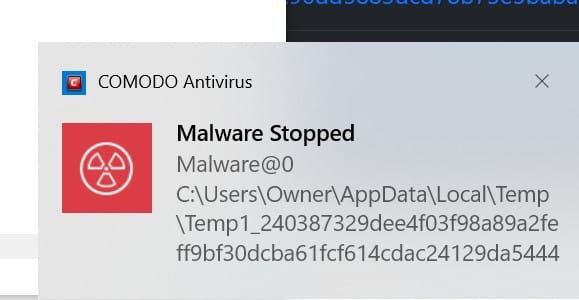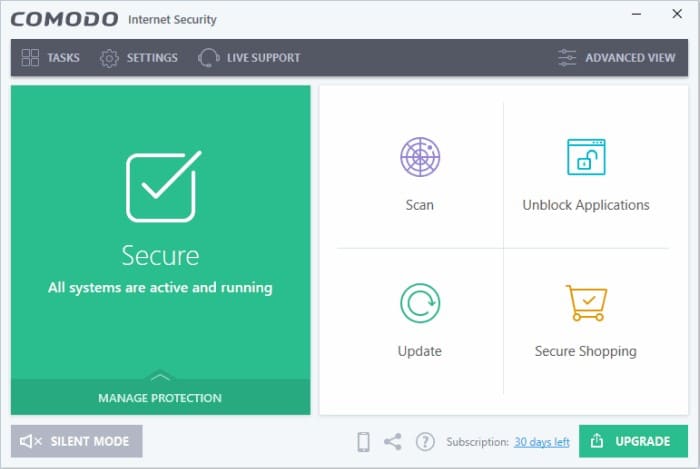In this Sophos vs Comodo comparison, I’ll be looking at the home versions of each provider’s antivirus software to find out which best protects against malware. Which is better? To assess this I will run two separate malware tests to measure how well Comodo and Sophos block real-time threats as well as offline and existing threats on my PC.
That’s not all, because finding the best antivirus means looking beyond malware blocking abilities. I have also run a few performance tests to find out how much Comodo and Sophos will slow down your PC during scans. I also look at pricing, features, security, and more.
Just want the result so you know which one to pick? I can tell you that Sophos is the winner. Want all the details on both providers? Read on for the full comparison.
Summary: Sophos vs Comodo
Sophos
- Low cost multi-device coverage
- Remote security management
- Parental controls
Comodo
- Low cost solution
- Performs well against malware
- Secure shopping feature
| Feature | Sophos | Comodo Complete Antivirus |
|---|---|---|
| Antivirus and antispyware | ✔ | ✔ |
| Firewall | ✔ | ✔ |
| Webcam protection | ✖ | ✖ |
| Password manager | ✖ | ✖ |
| Anti-phishing | ✔ | ✔ |
| Ransomware protection | ✔ | ✖ |
| Banking and payment protection | ✔ | ✖ |
| Parental control | ✔ | ✖ |
| Network attack protection | ✔ | ✔ |
| Encrypted storage | ✖ | ✖ |
| Automatically update apps | ✖ | ✖ |
| VPN | As a separate subscription | ✖ |
| PC cloud backup | ✖ | ✔ |
| File shredder | ✖ | ✖ |
| Performance optimization | ✖ | ✖ |
| Identity theft protection | ✔ | ✖ |
| Run suspicious apps in sandbox | ✖ | ✔ |
BEST DEAL FOR SOPHOS:Save 25% on award-winning antivirus and protect all of your devices on a single subscription.
BEST DEAL FOR COMODO:Subscribe to Comodo and get a 30 day completely free trial without any commitments.
Background
Sophos
Sophos has been around in the computer protection space for more than 30 years. Its products are in use in 150 countries to secure networks used by millions of users. In addition Sophos also has over 500,000 business customers. Its endpoint security solutions are used to secure every kind of network endpoint including laptops, virtual desktops, and servers.
Comodo
Comodo became popular thanks to its free antivirus. It’s founder, a Turkish-American engineer, once challenged other antivirus brands to a face off, believing that free antivirus performed just as well as paid products.
Today Comodo is in different ownership and also offers a paid antivirus package that includes a number of performance and security enhancements.
Sophos vs Comodo Pricing
Sophos Free Antivirus
The free antivirus software on offer from Sophos has AI-led real-time antivirus protection. It’s also got parental controls so you can filter web content to protect children, plus a web protection feature that will block you from visiting malicious links. There’s remote management, and coverage of three different devices. While Sophos Free Antivirus is good for a zero cost option, it does miss a few essential tools for privacy and protection found in the paid version.
Sophos Premium Antivirus
Sophos Premium Antivirus costs $68.33 (£49.95) per year. At the time of writing Sophos is offering a discount of 25% on the first years’ subscription. The discount reduces the cost to $51.26 (£37.46) for the first year.
There are other ways to save money too. You can extend your subscription to two or three years and you’ll get a lower price per year. Coverage for two years currently costs $92.72 (equivalent to $46.16 per year) with the discount. Cover for three years is $117.99 (equivalent to $39.33 per year).
This suite includes protection mentioned in the free version plus malware removal, ransomware security, banking and privacy protection, web security, remote network management, and premium support.
| Sophos Free | Sophos Home (up to 10 devices) |
|---|---|
| Free | $68.33 (£49.95) per year |
Comodo Free
Comodo offers home users a free antivirus program that includes real-time scanning for online protection. Comodo uses a dual-scanner approach so you also get its proactive malware defense scanner, a sandboxing tool, and a spyware scanner.
Comodo Complete Antivirus
Comodo Complete Antivirus is Comodo’s paid version of its software. It bundles everything you get with the free version alongside a few extra tools such as a firewall, web filtering tool to block malicious websites, and a secure shopping feature.
Comodo Complete Antivirus costs $29.99 for one PC or $39.99 per year for three PCs. There’s also Mac and Linux versions available for the same prices stated above.
Comodo is the cheaper option of the two providers, though it does not offer as many features as Sophos. The paid option from Sophos includes discounts that reduce the cost to a price similar to Comodo’s.
Effectiveness against malware
Are Comodo and Sophos effective against malware? In order to find the on-demand and real-time scan effectiveness, I put them up against a number of malware test cases. The results will give us an indication on how well each program protects against threats downloaded from the internet plus how they deal with common viruses and threats such as trojans.
Real-time scanning results
EICAR (The European Institute for Computer Antivirus Research) has a number of virus test files that I will download to evaluate antivirus performance.
The first test I will perform will see how effective the real-time scanner performs against four EICAR files.
Two of the files from EICAR were in a zipped folder, and two were unzipped. As the table below shows both programs performed well.
| Test File | EICAR Sample 1 | EICAR Sample 2 | EICAR Sample 3 | EICAR Sample 4 | Live Sample 1 (Adware) | Live Sample 2 (Trojan) | Live Sample 3 (Trojan) |
|---|---|---|---|---|---|---|---|
| Sophos | Blocked | Blocked | Blocked | Blocked | Blocked | Blocked | Blocked |
| Comodo | Blocked | Blocked | Blocked | Blocked | Blocked | Blocked | Blocked |
Sophos’ real-time scan blocked all EICAR files and live malware samples.
Comodo’s real-time defense blocked everything at the point of download, showing that both Sophos and Comodo protect well against real-time threats.
On-demand scans
The on-demand scan functions will be familiar to you if you have ever had an antivirus program installed on your PC. Usually you will see a large button on the AV dashboard titled something like ‘Run Scan’. This is an on-demand scan—you choose when it checks the files on your PC. These system scans can also be scheduled to run when you are not using your PC.
The idea of on-demand scans is to check your system and find any viruses or malware that already exist on your device. To do this, I turned off the real time scanning function and downloaded the malware files to my device to see if the on-demand scan can find them.
For this test I had four EICAR files and three live malware files already downloaded onto the PC. I then ran on-demand scans to see how well they detected malicious files.
Sophos managed to find and remove all seven of the malicious files from my PC with its on-demand scan.
Comodo does not allow me to turn off real time scanning in its software, so it’s impossible to download the malware samples from the web while Comodo is installed. Even when those files can be downloaded onto a USB or before Comodo is installed, the program still automatically deletes them the moment I install it.
One final thing I wanted to look at was how deep a scan each antivirus performed on my PC and how long it took to complete the scan. Comodo and Sophos both had pretty quick full scan times compared to some antivirus programs I have tested. Comodo took 24 minutes and checked 495,365 items. Unfortunately Sophos does not provide data on how many items it checks, and the fact that the full scan only took 15 minutes to complete also raises some concerns on how deep it is checking the system.
| Test Type | Full Scan Time (minutes) | Full Scan # Items Scanned |
|---|---|---|
| Comodo | 24 | 495365 |
| Sophos | 15 | N/A |
To ensure my own malware tests are providing an accurate picture, I checked third-party antivirus lab reports on Sophos and Comodo from AV-Test and AV-Comparatives.
AV-Comparatives
AV-Comparatives two main tests are The Real World Protection Test and the Malware Protection Test. Similar to my own tests, one looks at real-time protection and the other at on-demand and offline protection. These tests are run at a much larger scale than I can perform with many more virus samples.
Unfortunately there is not much current data available on the Home version of Sophos, with its last inclusion in the test coming from October 2016. In this test Sophos blocked 93.9 percent of the 1619 samples tested against it. This is not a great score but the data is quite old so it’s hard to evaluate it. The business version of Sophos was included in the Real-World test from August-November 2021 where it blocked 98.3 percent of threats in the test. Comodo has not been included in AV-Comparatives real world tests.
Again there is little to no data for either provider in AV-Comparatives recent Malware Protection Tests. Let’s look at AV-test.
AV-Test Results
AV-Test uses two main tests. The first is protection against new recently discovered zero-day threats, and the second is protection against known malware that is already widespread and prevalent, discovered in the last 4 weeks.
Comodo was last tested during July and August 2019 and registered 100 percent success against 0-day real world threats in both July and August 2019. In the test to detect widespread and prevalent malware, Comodo again scored 100 percent protection in both July and August 2019.
Sophos was last tested in April, May, and June 2011 with a different version of its software, making the data too old to include in the comparison.
From my tests, it’s clear to see both Comodo and Sophos performed really well and blocked all the malware threats I put them up against. The lab tests data is not up to date enough to give us a clear picture of how Comodo and Sophos perform on a bigger scale of malware testing.
Impact on PC performance
Which program has the most impact on PC performance, Sophos or Comodo? To find out I will measure how much system resource usage increases during malware scans.
The table below shows the results during a quick scan.
| Test Type | Control CPU Utilization % (no scan) | Control Memory Utilization % (no scan) | Control Disk Utilization (MB/s) (no scan) | Quick Scan CPU Utilization % | Quick Scan Memory Utilization % | Quick Scan Disk Utilization (MB/s) | Quick Scan Time (seconds) |
|---|---|---|---|---|---|---|---|
| Sophos | 79 | 81 | 360 | N/A | N/A | N/A | N/A |
| Comodo | 12 | 77 | 25 | 100 | 66 | 52 | 101 |
Sophos does not offer a quickscan. Comodo saw a relatively intensive increase in CPU utilization but a drop in memory utilization and a relatively small increase of 22 MB/s in disk utilization.
This table below shows the performance results of a full scan.
| Test Type | Control CPU Utilization % (no scan) | Control Memory Utilization % (no scan) | Control Disk Utilization (MB/s) (no scan) | Full Scan CPU Utilization % | Full Scan Memory Utilization % | Full Scan Disk Utilization (MB/s) |
|---|---|---|---|---|---|---|
| Sophos | 79 | 81 | 360 | 97 | 85 | 431 |
| Comodo | 12 | 77 | 25 | 93 | 74 | 3006 |
The Sophos full scan increased CPU utilization by 18 percent,with memory utilization increasing by 4 percent. Disk utilization increased from 360 MB/s to 431 MB/s.
Comodo’s CPU utilization jumped by 81 percent. Disk utilization increased significantly too, from 25 MB/s to 2006 MB/s, while memory utilization dropped by 4 percent.
As with the malware protection results, I could not find much data from the independent testing labs to check against my own performance test data.
Comodo was included in AV-Test’s antivirus performance tests, which works by measuring the speed of common tasks while the AV software is running.
AV-Test’s latest available results gave Comodo an overall performance rating of 5.5 out of 6.
As there is not much data available from the labs I can only judge it on my own tests and the data I recorded. Overal l found Sophos to have less impact on PC Performance.
Sophos vs Comodo Features
Do Sophos and Comodo include good additional features? Which provider has the most useful tools for the average home user? The features are listed below, with a brief description of a few standout features from each program.
- Malware scan and clean
- AI Threat Detection
- Ransomware Security
- Security Management
- Privacy Protection
- Web Protection
- Webcam Protection
- Real-Time Antivirus
- Parental Web Filtering
- Premium Support
- Gaming mode
- Sandbox
- Firewall
- Secure shopping
- WiFi hotspot protection
- 50GB Online storage
- Unlimited live expert virus removal
Here is some more detail about the key features of each:
- Webcam protection: Sophos Home includes a webcam protection feature to ensure you can’t be spied on by hackers.
- Parental web filtering: Protect children online with the web filtering tool. You can block sites by category that may be damaging to your child.
- Ransomware Security: Sophos Home includes ransomware protection that detects and blocks any file encryption behavior.
- Gaming mode: A great feature for gamers, this ensures that Comodo does not slow down, interrupt, or stop you in play.
- Remote assistance: This feature gives you remote assistance from an expert who can remove any malicious files from your device should it ever be compromised.
- 50GB online storage: Comodo gives users up to 50GB of online storage to help protect and store valuable files such as photos in the cloud.
Signup and installation
The sign up and installation process for both Comodo and Sophos is efficient. Each website only takes a couple of clicks before you reach the installation pages for the software.
Once you are at the Comodo checkout page, it’s simple to subscribe and download the software installer file onto your PC.
Sophos’ website is well-designed, and the installation process is straightforward.
I got to their checkout page after three clicks and a little scrolling, and it was a regular four-step process to purchase the software.
How easy is the interface to use?
Comodo opts for a fairly inoffensive color palette with light green, gray, and white hues. It’s a subtle look but it functions very well with all the main features within easy reach from the home screen. There’s a handy status bar when you launch the Comodo app that tells you your device is currently protected, or if issues need to be resolved. All in all it is very reassuring.
The Sophos interface is minimalistic with a simple design. Easy to use for non-techies but there’s also plenty of customization available with some of the features, so those who want to tailor their antivirus program will be happy too.
The unusual thing about the Sophos interface is that it mostly acts as a shortcut to the web console where most of the settings are managed. The good news is that the online interface is just as easy to navigate as the desktop app.
Customer support
Do Sophos and Comodo give users a good level of customer support post-purchase? Let’s take a look at the support options from each provider to assess how well they look after users.
Sophos’ provides an in-depth customer support service that features a number of options on how to get help, at least for the paid version.
For paid users, live chat support on the Sophos website provides access to knowledgeable support personnel, between Monday to Friday, 8AM to 8PM Eastern US time. There’s also an FAQ page and a comprehensive knowledge base offered by fellow Sophos users.
Unfortunately there is no phone support line even for premium users, but overall a pretty comprehensive and easily accessible range of support is on offer. Users of the freeware are limited to support in the form of knowledge base articles.
Comodo has a live chat, a forum, and a knowledge base on its website. It also gives you a ticket support system, plus a phone support line.
To get to the antivirus support on the Comodo website you have to first go to the antivirus products page and then click through to support from there.
Sophos vs Comodo Conclusion
In conclusion, I liked features of both Sophos and Comodo and I was impressed with both provider’s results in my own malware tests. Overall both Sophos and Comodo were tied in my own malware tests and there was little available data from testing labs to see how the programs performed on a wider number of test cases.
As a result I am judging the winner based on other factors such as performance impact, additional features, and value for money. I make Sophos the winner in these categories thanks to its better performance numbers in my test, its extended feature list compared to Comodo, and the discounts available on its subscription costs.
See also:









